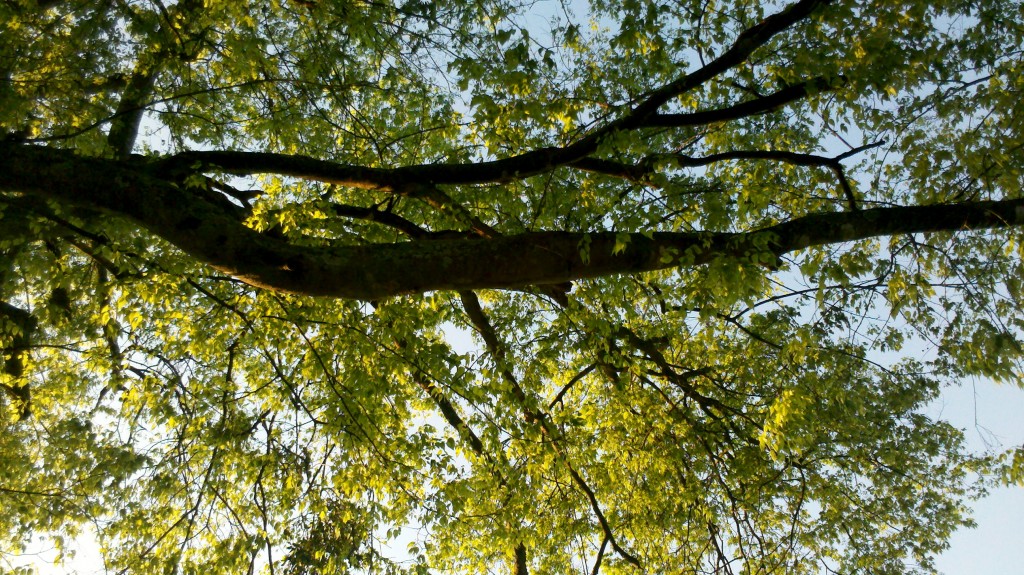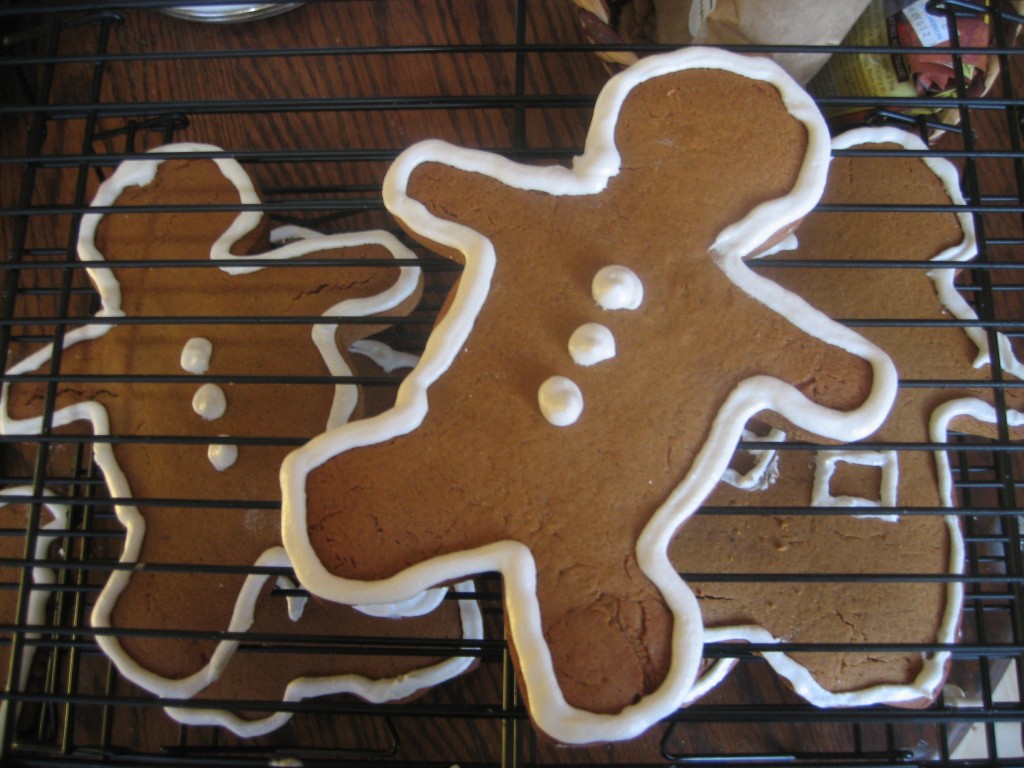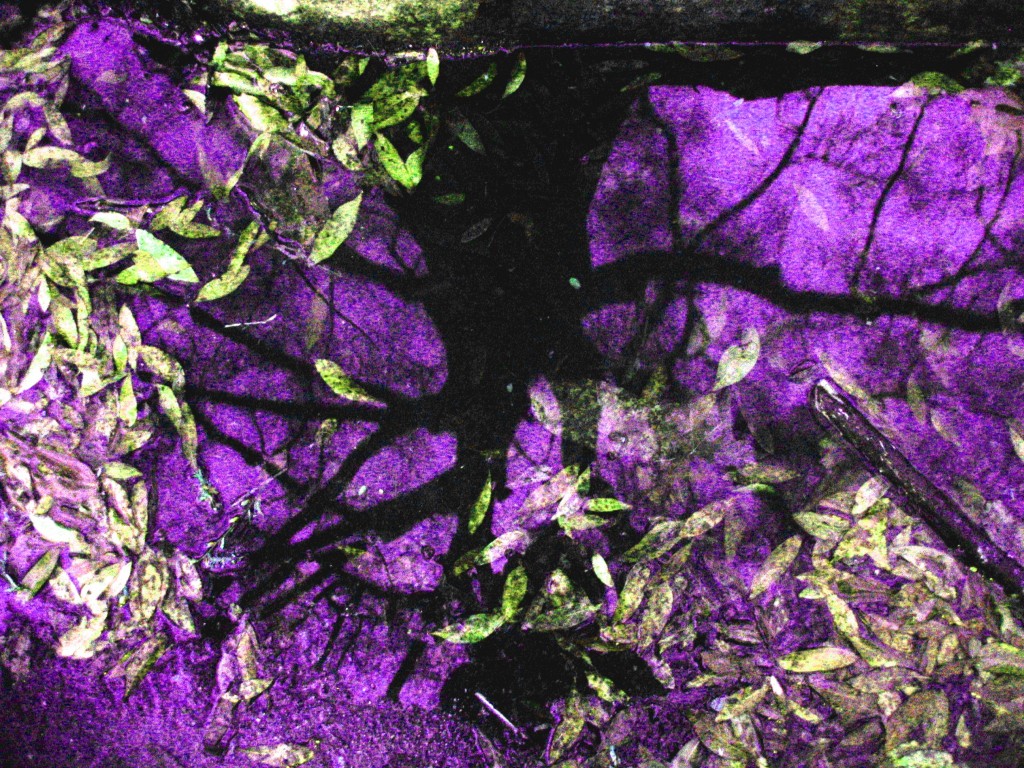Spring
 A wet black tree all
A wet black tree all
smothered by downy green leaves
seeps serenity.

Oftentimes, when Mr. Quotidian asks me what I’m thinking about, I have to answer “nothing.” Which isn’t to say that my mind is empty, but that what’s going through it cannot quite be called “thinking.” It’s much too fragmented and garbled to be a thought. What it can be described as is tinkering. Like Belle’s father in Beauty and the Beast, I half absentmindedly fiddle with a half forged idea. Most of the time, these musings simmer on the back fire while I putter about my life, occasionally pulling them out and trying to prod them into something coherent. Then, suddenly, when my back is turned, they will boil over into a mess of thoughts on the floor.
These posts are my way of taking those melted thoughts and trying to pound out something useful.
 A wet black tree all
A wet black tree all
smothered by downy green leaves
seeps serenity.
A fresh loaf of bread
cooling on a wire rack
in time for dinner.
 No other time of year seems to hold as many traditions for me as Christmas. The ornaments get hauled up from the basement, the dust blown off the old pear boxes they’re stored in. Each is carefully unswaddled from its nest of ten year old paper towel and hung on the tree. Little Bethlehems are constructed throughout the house, forming a kind of Yuletide suburban sprawl. Each of the mangers stay empty until Christmas morning. The soundtrack changes frequently as each of us takes our turn choosing our favorite music. Little Brother with Mannheim Steamroller, me with Bing Crosby and Ella Fitzgereld, Mom with hymns.
No other time of year seems to hold as many traditions for me as Christmas. The ornaments get hauled up from the basement, the dust blown off the old pear boxes they’re stored in. Each is carefully unswaddled from its nest of ten year old paper towel and hung on the tree. Little Bethlehems are constructed throughout the house, forming a kind of Yuletide suburban sprawl. Each of the mangers stay empty until Christmas morning. The soundtrack changes frequently as each of us takes our turn choosing our favorite music. Little Brother with Mannheim Steamroller, me with Bing Crosby and Ella Fitzgereld, Mom with hymns.
And then there are the nine different tins of Christmas cookies piled on the counter. Their colors a hodgepodge of cheery greens, wintery blues, rich reds, and ornate golds. Inside each tin is a different cookie– mixing of different cookies into the same tin is strictly forbidden. The cookies range from simple peanut clusters that take just minutes to make to Springerale cookies that get printed with a special rolling pin, cut apart, then left out to dry overnight. Chocolate pinwheels look fancy but are easy to make. Of course sugar cookies make their appearance, the amount of frosting and sprinkles adorning Rudolph’s antlers directly correlating to the age of the person who decorated them.
Somewhere in that pile of tins lies the gingerbread men. These always arrived with grandma’s return address on the box. There was exactly one gingerbread cookie per person. But we never thought we were getting jipped. These weren’t just any gingerbread cookies. As a child, they were as big as my face. I know this because I did it . . . holding the cookie up to my face and inhaling the sweet spicy scent. And they were intricately decorated with all different colors of frosting. The gingerbread men had textured vests and pants. The gingerbread girls had striped skirts and braids that looked almost real. They were the kind of cookies that the children in “The Night Before Christmas” dreamed about. Because they were so big, these cookies were eaten piecemeal . . . an arm or a leg at a time. Each of of us had a different method of decimating our cookie. I worked in a clockwise pattern starting with the head. Continue Reading…
It is an almost universally acknowledged fact that a man in possession of an item of food is in want of its origin. One can barely bring up the topic of last night’s dinner without someone bemoaning the fact that people don’t know where their food comes from. What they mean to highlight when they say this is the industrialization of our food system. By and large, not only do we no longer know the farmer who grew our food, we can’t even be exactly certain as to its continent of origin. And that’s true. A quick look around the produce aisle proves that most apples and garlic are from China, the asparagus is from Chile, and the raspberries are from God-knows-where. We could all get to know our food better, whether that means stopping by a farmer’s market or finally figuring out what’s killing the squash.
The bone I do wish to pick, however, is with the shallowness of the statement. “People don’t know where their food comes from,” is, at its core, a statement of geography. Nothing else. Concepts of terroir aside, we must recognize that food is more than geography. There is more than a where, there is also a how. People don’t know how their food comes to them. They have no idea the kind of effort, skill, and knowledge that goes into growing food.

I originally wrote this for a Creative Writing class.* The weather today and a recent conversation with my sister made it seem appropriate to post it here.
The sky soothes into quiet and Light commences a waltz with Shadow around the sála. The bamboo chimes begin to move, at first a slow seductive twirl like a dancer’s hips but quickening till the chimes spin way out like a whirling dervish’s skirts. In the beginning, the rain is all humility and meekness. It’s coming is heralded by small, not gaudy, changes – the patterns running down the window, the spattered mud leaping a few inches up the wall, the banana leaves casually bouncing like a woman’s foot when she crosses her legs. And the sound!…echoing differently off each wall, as if trying to find the right pitch. It’s accompanied by the wonderful cool breeze that blows through the windows, making the curtains drum their fingers in rhythm. Everyone in the room seems to perceive its advent at exactly the same moment, and they hover around the window to watch the nativity progress.
The birth of the rain smells like dust. I count each tiny bead of water as it falls to the ground with a hollow plop. But then the plops increase to higher sounds, like marbles dropped in a sink. The air now smells clean, all the dust being purified from it. I can’t do anything but lie back on my bed and listen to the sound of the whole jungle surrounding me, drowning in soft pattering drips. The angel chorus of birds still sing…bursting out in occasional solos, their sopranos balanced by the deep bass of thunder. All of this to the beat of a million drops, each one hitting its own note and boggling my mind that I am hearing every one of them.
Soon, its still small voice beckons to me between the drops. I rise from my bed and follow it. I hug the wall and slither past my mother. Then it’s all splashing in puddles and squeezing mud between my toes and getting gloriously, gloriously wet. The rain trickles down into my eyes and plasters my hair to my head. The moisture hangs heavy on my eyelashes and transforms the ordinary world into trickling visions. The weight of it forces my eyes closed and the vision slides down my cheeks like tears. I look behind me at my footprints in the mud. I watch as the rain fills them and the shapes are distorted into puddles. I again think of each individual drop it takes to fill the puddle. As each new drop lands, the puddle itself reaches up, as if begging for more.
I gaze across the valley and watch the approaching wall of grayness, knowing I have only a few moments before I am discovered and my mother calls me inside. So I race the oncoming bulwark to my favorite tree. Slipping and sliding all the way, I scramble up the slippery bark, onto my favorite branch, barely beating the barrage of wetness. It hits me in the face like sopping sheets. I reach out to stop them, only to discover they slip through my fingers like ghosts and smack me anyway. The rain swaddles me in its self, making me breathe in its rhythm. I cannot see past the shroud it has hung on the outermost branches, burying reality. It is easy to wonder if all the rest was merely a dream.
Just as I get accustomed to this revelation, my house begins to materialize…cloudy at first, as if turned impressionist, but becoming clearer and sharper. A sense of relieved disappointment fills my chest as the rain welled up in my footprints. I must go back. The way back is longer and more laborious. I am forced to pick my feet up high with each step out of the mud, like an ancient Hebrew slave making bricks. The clothesline guards the border to reality and I watch the rain drops tiptoe to the middle of the line and hesitate until the next one pushes too hard and it slips off into the unknown. At the back door my mother is already wielding the hose, trying to look condescending, but not quite able to banish the smile from her eyes. Deep down I recognize her own longing. I see her mouth form the words “filthy” and “clean up” but can’t hear it above the rain on the tin roof. With a shake of her head, she commences the ceremonial cleansing which I must endure if I wish to enter the house -first my face, then my arms and legs, and finally my bare feet. I surrender to her ministrations until the mud swirls down the drain. Then I shloosh free. My feet smack against the cool cement floor and I find I must walk carefully or risk slipping.
Once inside, I prefer not to shower, liking the natural feel on my skin. I return to the cloud of people at the window and join the eager curiosity of witnessing the front yard fill up like a bathtub and guessing which step that afternoon’s rain will climb to….
That is the rain in the Philippines. Everything else is just drizzle.
*While this is my writing, the original inspiration came from another missionary kid many years ago. He published it on a MK message board. If anyone knows who it was, I would love to give him credit.
Michael Rulman, a journalist chef, recently listed the reasons he cooks on his blog. He then asked the question that launched a thousand comments- why do you cook? The responses, though many, seemed to play variations on two themes- health and enjoyment. People cook because it is easier to have control over both ingredient selection and proper preparation. They also cook because they’d rather unwind in front of the stove than the TV; it’s enjoyable.
I think this is an important question to for everyone to answer, even if your answer is the same as everyone else’s. In the middle of your third stack of dishes, with five more stacks to go, it helps to remember why you do this thing called cooking.
I cook because . . .
Whirl. Chink. Whirl. Hand cramps.
I must stay here, keep turning-
Thin clear turns thick white.
Stalking Wonder*.
Doesn’t that sound like a noble pursuit? It has the tinge of both the hunter and the poet about it. Of all the things that we stalk- a happy marriage, good books, comfortable shoes, the perfect tomato, a good cup of coffee, a rewarding career- I think wonder is among the most neglected. Perhaps because it is wonderfully non-essential to life. A person could go along perfectly well, happy even, without it. There is no physical need to pause in a chunk of warm sunlight before passing on. But there is little doubt that life becomes more pleasurable with such moments. Continue Reading…
(This summer, one of my duties as Round River Farms intern is to write a weekly newsletter to our shareholders. I’ll be posting these newsletters here too. So you can eavesdrop even if you can’t enjoy the vegetables I’m growing…)
It’s become a bit of a joke at my house to ask for the full pedigree of any food we eat. Whatever I cook, Gary, my husband, will ask if it’s “organic, local, and grass-fed.” Although it began as genuine delight over the wealth of produce and good quality meats at my farmer’s market, it quickly devolved into something more cynical. Exasperated at once again finding no junk food in the house, Gary asked me when I was going to buy some organic local grass-fed Twinkies. Even as I laughed, his sarcasm made me pause and consider just what all the labels meant anyway?
What is it about “local food” that makes me respond like one of Pavlov’s salivating dogs? Is geographical proximity alone the determining factor? Frito-Lay seems to think so. In May, the company launched a new advertising campaign in which they market their potato chips as “local.” After all, the potatoes they use have to be grown somewhere, right? And that somewhere has to be local to someone, right? So, potato chips could be a guilt-free local snack…as long as you’re lucky enough to live near a Lay’s potato farm.
Bi-Lo is trying to cash in on the local concept too. As I was walking out of Bi-Lo the other day, I noticed a banner advertising “Walter’s Local Produce.” The banner seems to shout the question: Who in the world is Walter anyway? A quick search of their website reveals that Walter is Bi-Lo’s deified produce manager. Walter, it turns out, is the one responsible for the fates of all the little fruits and vegetables that roll around your cart. Although he is revered for his pickiness over produce, there is little else said about him. The most personal thing on the page is a photograph of a disembodied hand. I left the site wondering if “Walter” really existed, or if he was just a corporate cardboard cut-out. No doubt, the brand “Walter’s Produce” is meant to evoke the feeling you are buying your apples and broccoli from a roadside stand owned by a man named Walter. Is that what makes food local then? Knowing that some kindly produce manager in the sky is triple checking your bananas for bruised spots?
Clearly, neither of these companies really gets it. “Local” has become shorthand for something much more complex than geography. I’ve come to the tentative conclusion that “local” has something to do with the community of people surrounding our food. I think Erin Barnett, the editor of Local Harvest, is on to something when she says that local food is “food we know in our bellies we can trust.” In the world of modern foods with ingredient labels that sound like a grocery list from Mars, trust seems to be on back order. Not only have we lost a sense of where our food comes from, but also who it comes from. Local food, on the other hand, has a history that can be known. You can come see your peas and cucumbers hanging on the vine, run your fingers through the dirt they grow in, and even harvest them yourself. Even more than that, it’s possible to get to know the people growing your food. Your brain, your heart, and your belly can trust true local food.
I’d like this newsletter to help grow that trust this season. In future letters, I’d like to tell you the story of the vegetables in your share each week, including growing conditions, nutritional information, storage tips, and recipes. More importantly, I’d like to use this newsletter for us to get to know each other better. Please feel free to leave comments – your thoughts on what I’ve written, questions about the vegetables in your share, tips on how to use up all that zucchini, ect. So, you can snap those peas and chop those tomatoes, knowing that you can trust where (and who) they came from . . . and that there are others snapping and chopping right along with you.
Eat Well,
Jana